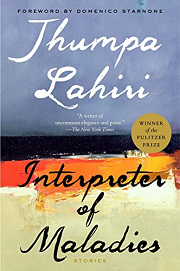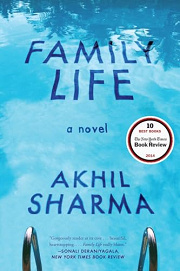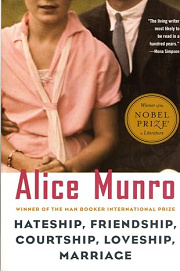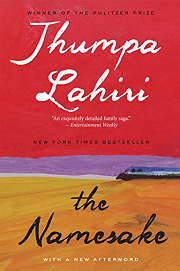Share your thoughts in a quick Shelf Talk!
Interpreter of Maladies by Jhumpa Lahiri
From crowded streets to quiet kitchens, lives intersect in moments of longing, humor, and hard-won understanding across continents and generations. Interpreter of Maladies offers nine exquisite stories that illuminate the ties that bind us—and the distances that remain.
Have you read this book? Share what you liked (or didn’t), and we’ll use your answers to recommend your next favorite read!
Love Interpreter of Maladies but not sure what to read next?
These picks are popular with readers who enjoyed this book. Complete a quick Shelf Talk to get recommendations made just for you! Warning: possible spoilers for Interpreter of Maladies below.
In Interpreter of Maladies, did you enjoy ...
... quiet, stand-alone immigrant vignettes that echo with displacement and longing?
The Thing Around Your Neck by Chimamanda Ngozi Adichie
If the way stories like “A Temporary Matter” and “Mrs. Sen’s” deliver whole lives in a few, resonant scenes grabbed you, The Thing Around Your Neck will feel like coming home. Adichie’s compact stories about Nigerians in America carry the same precise sting—moments as intimate as Eliot watching Mrs. Sen slice vegetables or Mr. Kapasi’s fleeting fantasy of letters—each vignette crystalline, self-contained, and quietly devastating.
... an intensely domestic, close-quarters portrait of an immigrant family?
Family Life by Akhil Sharma
If you were moved by the apartment-bound intensity of “A Temporary Matter” or the small flat shared in “The Third and Final Continent,” Family Life offers that same intimate focus. Following Ajay’s family after a tragic accident, the novel lingers on the kitchen-table negotiations, hushed phone calls, and quiet endurance that echo the tender, room-to-room emotional mapping Lahiri brings to Shoba and Shukumar’s nightly confessions.
... subtle, character-first stories that burrow into private motives and misreadings?
Hateship, Friendship, Courtship, Loveship, Marriage by Alice Munro
If Mr. Kapasi’s daydreams in “Interpreter of Maladies” and Miranda’s self-justifications in “Sexy” hooked you for how they expose the heart’s rationalizations, Munro’s collection will enthrall you. Her stories turn on the same fine calibrations—tiny choices, misunderstood signals, and interior reversals—until a single letter, glance, or offhand remark reframes everything, much like Mrs. Das’s confession rewires Kapasi’s fantasies in an instant.
... a nuanced exploration of immigrant identity, belonging, and name-bound selfhood?
The Namesake by Jhumpa Lahiri
If the quiet negotiations of identity in “The Third and Final Continent” and the cultural distance in “Mrs. Sen’s” resonated, The Namesake deepens those questions through Gogol Ganguli’s life. You’ll recognize Lahiri’s gift for the small, telling detail—awkward dinner parties, fraught introductions, the weight of a name—rendered with the same gentleness that made Mrs. Croft’s “Splendid!” and Eliot’s lonely afternoons unforgettable.
... clear, unfussy prose that lets quiet emotional shocks land without spectacle?
A Thousand Years of Good Prayers by Yiyun Li
If you admired how Lahiri’s plainspoken sentences in “A Temporary Matter” and “Sexy” carry profound aftershocks, Yiyun Li’s stories will speak to you. Her lucid style—no ornament, just the right word—creates the same delayed resonance: a restrained conversation that detonates later, the way Rohin’s definition of “sexy” (“loving someone you don’t know”) keeps echoing long after the scene ends.
Unlock your personalized book recommendations! Just take a quick Shelf Talk for Interpreter of Maladies by Jhumpa Lahiri. It’s only a few questions and takes less than a minute.





